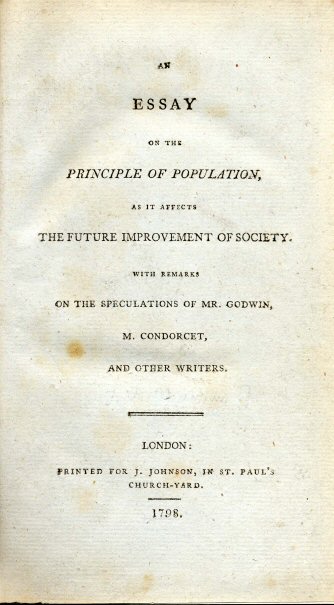Thomas Malthus published “An Essay on the Principle of Population” on June 7, 1798. The essay and the name of Malthus have become synonymous with the idea that humans, because of the growth of their population, will eventually run out of resources, leading to conflict and famine. In other words, human existence is fundamentally unsustainable.

Thomas Robert Malthus was an English academic and cleric who lived from 1766 to 1834. He was educated at Cambridge University and eventually became a professor of history and political economy. He was deeply interested in the statistics of populations, from birth to death and everything in between—co-founding the Statistical Society of London in 1834. His work was sufficiently regarded to earn him membership in the Royal Society and the Political Economy Club. Despite his high ranking in society, it seems he was a pretty regular guy—he always just called himself “Bob.”
While Malthus’ other works may have been important during his life, it is his essay about population that has maintained his prominence today. In the essay, he relates that the human population grows exponentially—that is, very rapidly—while the ability of humans to raise food and other necessary resources grows arithmetically—that is, rather slowly. Malthus reasoned that the size of the human population would eventually outgrow available resources and a state of misery and vice would take over, effectively but painfully keeping the human population in check. In other words, human life as we know it is not sustainable.
Malthus’ idea is generally cited as the argument for pessimism in the future by environmentalists who view humankind through dim eyes. For example, the idea is basically the same as that advanced by Paul Ehrlich in his 1969 book, The Population Bomb, which predicted that global famine would prevail as early as the 1970s. Malthusian ideas (now often referred to as Neo-Malthusian) remain popular.

Malthus also believed that because misery was the tool that nature used to check the size of the human population, attempts to improve the conditions of the poor were misguided. Helping the poor, he reasoned, reduced misery, leading to higher birth rates and population growth—which would eventually lead to more misery. We know today that reality shows the exact opposite. Improved quality of life, through better nutrition, health care, education and the like, does lead to a higher population growth rate for a time, but then the growth rate slows and then stabilizes. Prosperity, not poverty, checks population growth.
References:
BBC History. Thomas Malthus (1766-1834). Available at: http://www.bbc.co.uk/history/historic_figures/malthus_thomas.shtml. Accessed June 8, 2017.
Encyclopedia Britannica. Thomas Malthus. Available at: https://www.britannica.com/biography/Thomas-Malthus. Accessed June 8, 2017.
Library of Economics and Liberty. An Essay on the Principle of Population. Available at: http://www.econlib.org/library/Malthus/malPopCover.html. Accessed June 8, 2017.
Library of Economics and Liberty. Thomas Robert Malthus. Available at http://www.econlib.org/library/Enc/bios/Malthus.html. Accessed June 8, 2017.
